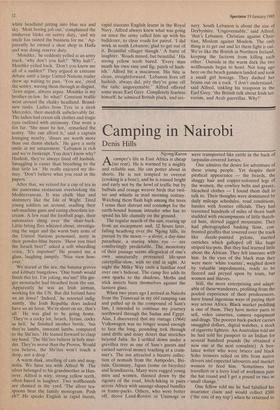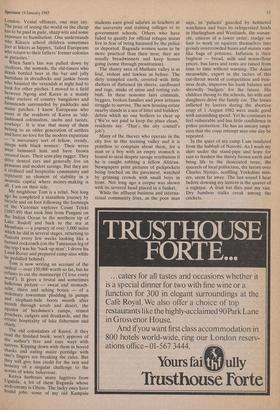Camping in Nairobi
Denis Hills
Ngong/Karen Acamper's life in East Africa is cheap (no rent). He is warmed by a mighty and reliable sun. He can potter about in shorts. He is not tempted to overeat (cooking is a bore); and he is roused bright and early not by the howl of traffic but by bulbuls and orange weaver birds that twit- ter and whistle in mad morning ecstasy. Watching them flash high among the trees I sense their distrust and contempt for the earth-bound human intruder who has to spend his life clumsily on the ground.
The regular march of the sun, rearing up from an escarpment and, 12 hours later, falling headlong over the Ngong hills, its pursuit by the moon — a sliver, a day-time parachute, a staring white eye — are comfortingly predictable. The monotony of their passage seems allegorical of one's own unnaturally protracted life-span caterpillar-slow, with no end in sight. At night the Milky Way casts a familiar roof over one's hideout. The camp fire adds its own sparks to the shadows. Moths and stick insects burn themselves against the lantern glass.
When two years ago I arrived in Nairobi from the Transvaal in my old camping van and pulled up in the compound of Sam's Inn, I intended to continue my journey northward through the Sudan and Egypt. Alas, I discovered that my vintage (1964) Volkswagen was no longer sound enough to face the long, pounding trek through sand drifts and stony desert that stretches beyond Juba. So I settled down under a grevillea tree as one of Sam's guests and earned survival money teaching at a cram- mer's. The inn attracted a bizarre collec- tion of nomads from the Antipodes, Bri- tain, Germany, Japan (some on bicycles) and Scandinavia. Many were rugged young men and women, thinned down by the rigours of the road, hitch-hiking in pairs across Africa with sausage-shaped bundles or frame-packs. Others, who were better off, drove Land-Rovers or Unimogs or were transported like cattle in the back of tarpaulin-covered lorries. One admires the desire for adventure of these young people. Yet despite their piratical appearance — the beards, the shaggy hair and copper-coloured legs of the women, the cowboy belts and greasy, bleached clothes — I found them dull to talk to. Their thoughts were dominated by daily mileage schedules, road conditions, hassles with frontier officials. They had traversed hundreds of miles of thorn bush studded with encampments of little thatch- ed huts, skirted jagged mountains. They had photographed basking lions, con- , fronted giraffes that towered over the track like dazzle-painted pylons, startled ostriches which galloped off like huge striped tea-pots. But they had learned little about the African. They felt insecure with him. In the eyes of the black man they were mere 'white tourists', weighed down by valuable impedimenta, ready to be fleeced and preyed upon by touts, bar women and thieves.
Still, the more enterprising and adapt- able of these-wanderers, profiting from the pooled experience of their predecessors, have found ingenious ways of paying their Way across Africa. Black market peddling is one of them. They have motor parts to sell, video cassettes, camera equipment and drugs. The poorest back-packer carries smuggled dollars, digital watches, a stock of cigarette lighters. An Australian told me he had sold his passport to an Indian for several hundred pounds (he obtained a new one at the next consulate). A free- lance writer who wore braces and black $oho trousers relied on lifts from native drivers and expected labourers and market women to feed him. 'Sometimes bus travellers or a lorry load of workmen pass the hat round and I get a pound or two in small change.'
One fellow told me he had falsified his insurance claim and would collect £500 (`the cost of my trip') when he returned to London. Venial offences, one may say. The price of seeing the world on the cheap has to be paid in guile, sharp wits and some exposure to humiliation. One understands why Kikuyu school children sometimes jeer at hikers as hippies, `failed Europeans who return to their fathers' former colonies as parasites.'
When Sam's Inn was pulled down by creditors, the nomads, the old-timers who drank bottled beer at the bar and jolly harridans in dreadlocks and junkie boots who haunted the verandah at night had to look for other pitches. I moved to a field between Ngong and Karen in a mainly white enclave of country bungalows and farmsteads surrounded by paddocks and maize patches. I know Europeans who sneer at the residents of Karen as `old- fashioned colonialists, snobs and racists, cowboys'. It is true that many of them belong to an older generation of settlers and have no love for the modern expatriate — `a mercenary sort of fellow, trendy, sleeps with black women'. Their wives wear brimmed hats and have brown creased faces. Their sons play rugger. They drive dented cars and generally live on Pensions and modest savings. But they are a civilised and hospitable community and represent an element of stability in a neurotic capital where money-making is all. I am on their side.
_ My neighbour Tom is a rebel. Not long ago he completed a marathon journey by bicycle and on foot following the footsteps of the Victorian explorer Count Teleki (1887-89) that took him from Pangani on the Indian Ocean to the northern tip of Lake Rudolf and back to the sea at Mombasa — a journey of over 3,000 miles which he did in several stages, returning to Nairobi every few weeks looking like a burned cockroach (on the Tanzanian leg of the trip I was his `back-up man'; I drove his Land-Rover and prepared camp sites while he pedalled behind). Tom is now writing an account of the ordeal — over 150,000 words so far, but he refuses to cut the manuscript CI love every word'). It gives a brutal and sometimes ludicrous picture — sweat and stomach- ache, thirst and aching bones — of a sedentary townsman plodding in pumps and elephant-hide boots month after month through scrub and desert, the squalor of herdsmen's camps, armed Poachers, cadgers and drunkards, and the erratic hospitality of lake fishermen and chiefs.
The old colonialists of Karen, if they read the finished book, won't approve of the author's free and easy ways with natives. Kipping down with them in horrid shacks and eating maize porridge with one's fingers are breaking the rules. But they will give him credit for the zest and honesty of a singular challenge to the norms of white behaviour.
Kenya harbours many fugitives from Uganda, a lot of them Baganda whose arch-enemy is Obote. The lucky ones have found jobs: some of my old Kampala students earn good salaries as teachers at the university and training colleges or in government schools. Others who have failed to qualify for official refugee status live in fear of being harassed by the police or deported. Baganda women seem to be more practical than their men; they are usually breadwinners and keep homes going (some through prostitution).
The shanty area of Mathare valley is as foul, violent and lawless as before. The dirty trampled earth, covered with little shelters of flattened tin sheets, cardboard and rags, stinks of urine and rotting rub- bish. In these noisome lairs criminals, beggars, broken families and poor artisans struggle to survive. The new housing estate nearby stands in a sea of litter and builders' debris which no one bothers to clear up (We're not paid to keep the place clean,' residents say. `That's the city council's job').
Many of the thieves who operate in the city live in this teeming valley and it is pointless to complain about them, for a man or a boy with an empty stomach is bound to steal despite savage retribution if he is caught robbing a fellow African. Newspapers print pictures of pickpockets being lynched on the pavement, watched by grinning crowds with small boys in front. Not long ago a corpse was shown with its severed head placed in a basket.
While the affluent business and interna- tional community lives, as the poor man says, in `palaces' guarded by helmeted watchmen and buys its refrigerated foods in Hurlingham and Westlands, the wanan- chi, citizens of a lower order, trudge on foot to work or squeeze themselves into grossly overcrowded buses and matatu vans like bags of potatoes. Inflation is their bugbear — bread, milk and maize-flour prices, bus fares and rents are raised from time to time without warning. The Asian meanwhile, expert in the tactics of this cut-throat world of competition and busi- ness deals, improves his bank balance and shrewdly `budgets' for the future. His children throng to the schools, his wife and daughters drive the family car. The losses inflicted by looters during the abortive coup of 1 August 1982 were made good with astonishing speed. Yet he continues to feel vulnerable and has little confidence in police protection. He has an uneasy suspi- cion that the coup attempt may one day be repeated.
In the quiet of my camp I am insulated from the hubbub of Nairobi. As I wash my shirt under the stand-pipe and hope for rain to freshen the thirsty brown earth and bring life to the desiccated trees, the quarrels of local politicians, the furore over Charles Njonjo, scuffling Yorkshire min- ers, seem far away. The last sound I hear before dowsing my lantern is the quaver of a nightjar. A fruit bat flies past my van. Dry bamboo stalks creak among the crickets.











































 Previous page
Previous page